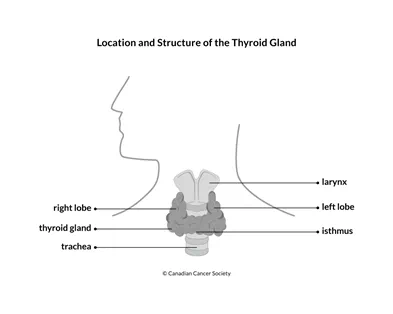The thyroid
The thyroid is a

Structure of the thyroid
The thyroid is shaped like a butterfly and has a right and left lobe. The lobes are joined by a thin piece of tissue called the isthmus. Inside the thyroid are many small, round sacs called follicles. The follicles make, store and release thyroid hormones.
The thyroid is made up of different types of cells. The follicles are lined with follicular cells. C cells (also called parafollicular cells) are scattered throughout the thyroid, including in the lining of and between the follicles. Other types of cells within the thyroid include lymphocytes (a type of white blood cell) and fat cells (called adipocytes).
Thyroid hormones
The thyroid makes hormones that control the body’s growth, development and metabolism (how the body uses energy). These hormones help:
- break down food and change it into energy
- control body temperature
- control heart rate and blood pressure
- control breathing
- keep the
nervous system working normally - the brain develop in children
Thyroxine (T4) and triiodothyronine (T3)
The follicular cells take in iodine from the blood, which is used to make the hormones thyroxine (T4) and triiodothyronine (T3). Iodine is a mineral we get from certain foods. In developed countries like Canada, iodine is added to table salt to make sure it is part of the diet and the body can make enough thyroid hormones to keep it working properly.
The follicular cells also make thyroglobulin (Tg). Tg is a protein that stores T4 and T3 until the body needs them.
How much T4 and T3 the thyroid makes is controlled by thyroid-stimulating hormone (TSH, or thyrotropin). TSH is a hormone made by the
Calcitonin
C cells in the thyroid make the hormone calcitonin. Calcitonin helps control the level of calcium in the blood. It does this by slowing down the release of calcium from bones and increasing the amount of calcium excreted from the kidneys into the urine.
